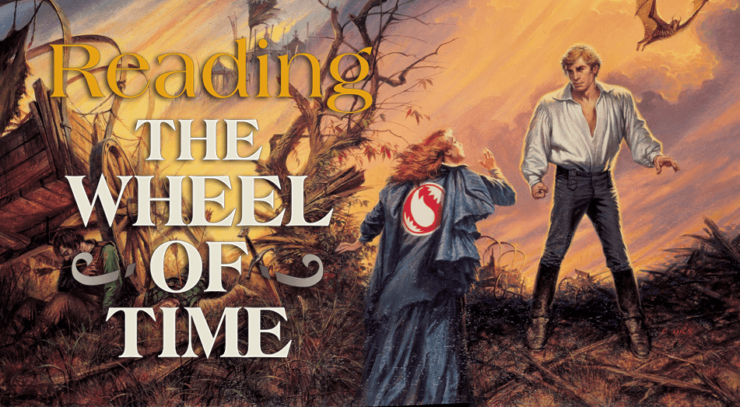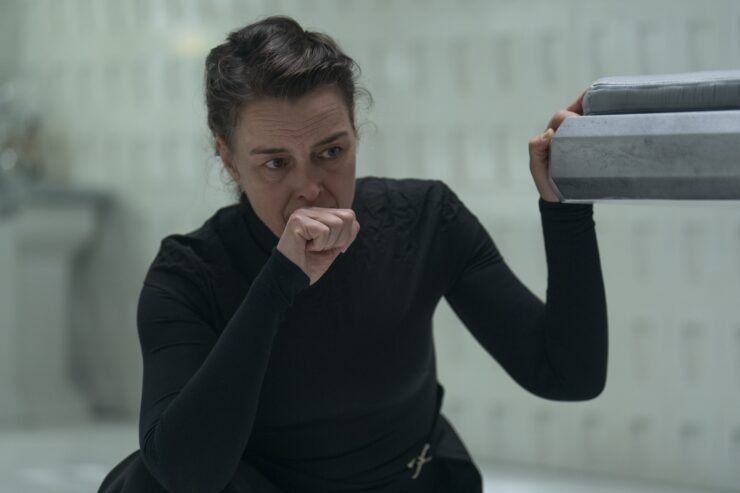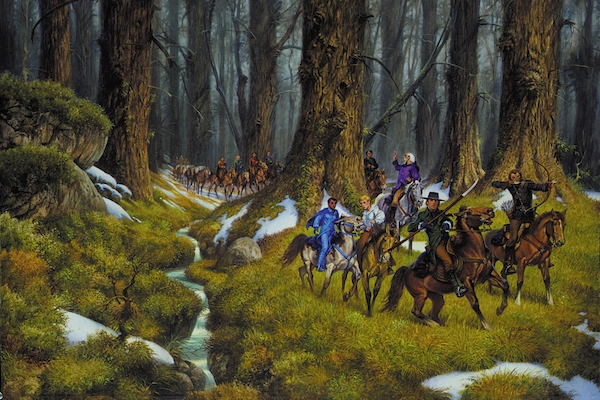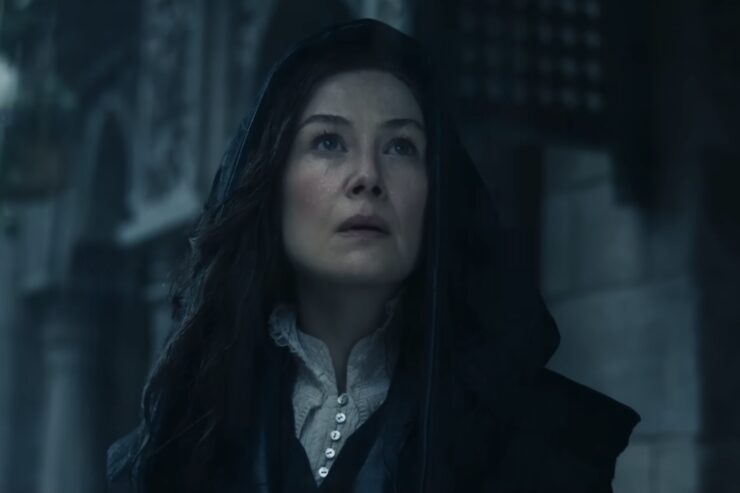Hello friends, welcome once more to Reading The Wheel of Time! We are traveling to Cairhien this week, to hang with Berelain and Rhuarc, and so that Rand can have a very disappointing catch up with Egwene. His school in the city is very cool, though, and I’m very curious to see the first hints of steam power and industrialized farming showing up in this world.
But that’s getting ahead of ourselves. First, let’s get to recapping Chapters 17 and 18 of Lord of Chaos. Off we go!
Rand opens a gateway into a room in the Sun Palace, and he and Aviendha step through, along with his escort of Maidens and Red Shields. In the hall he is greeted by the Aiel standing guard as well as various Tairen and Cairhienin soldiers and two Wise One apprentices. There is a little relief in having Alanna farther away, but not much, and he wonders if there’s any way to get free of her.
You never escape the traps you spin yourself. Lews Therin’s murmur sounded confused. Only a greater power can break a power, and then you’re trapped again. Trapped forever so you cannot die.
He notices suddenly that Aviendha has already scurried away, and feels sour that she’s in such a hurry to report on him to the Wise Ones. Berelain and Rhuarc arrive and Berelain greets him, asking after Perrin and Mat as she always does. Rand reflects on his reasoning for putting Berelain in charge. As they walk, he asks after Egwene, then is startled when they pass a courtyard in which they can see noblewomen practicing with swords, observed by an instructor and waited on by white-clad servants.
Berelain explains that some Cairhienin women are quite taken with the Aiel, and wish to become Maidens themselves, though of the sword rather than the spear. In particular, the women Rand is now observing are women from noble houses.
“I let them stay here because their parents would not allow this. There are nearly a dozen schools in the city now that will teach the sword to women, but many need to sneak away to attend. It is not only women, of course. The younger Cairhienin in general seem very impressed with the Aiel. They are adopting ji’e’toh.”
Buy the Book


The Eye of the World: Book One of The Wheel of Time
Rhuarc counters that they are mangling it, complaining of all the ways that the Cairhienin are changing the customs and strictures of ji’e’toh. Berelain argues that they are merely adapting it, and points out that duels in the city tend to end with one party claiming to be gai’shain rather than ending in death, which she sees as an unqualified good. Rand himself only half understands ji’e’toh—much of what the Aiel consider honor and obligation, Rand finds as foolish as anything the Cairhienin are doing—but more to the point, he feels he has to back Berelain since she is the one he has given authority here.
They move on to Berelain’s study, where Rand dismisses the Aiel accompanying him and tells them to go catch up with friends and family, allowing only two to stay and guard him. In the study, Rand, Berelain, and Rhuarc discuss how House Riatin and House Damodred, allied against him, have been rumored to be gathering Andoran soldiers. They discuss the fact that the Shaido are building holds, and how both the Wise Ones and Rhuarc believe that the Shaido don’t ever intend to return to the Waste. There is also news that there is fighting in Shara—Rhuarc explains to Rand that there is never fighting in those lands, and that those who come to trade with the Aiel have mentioned the Dragon Reborn Breaking the World.
They talk about the plans for Sammael, then Berelain catches Rand up on the conditions in Cairhien. They are interrupted by the arrival of Mangin, and Rand is surprised when both Berelain and Rhuarc grow somber and urge him to speak to the man at once. Mangin announces, without preamble, that he has killed a man and wants to know if he has toh to Rand. He and Rhuarc explain that a Cairhien man had tattoos of the Dragon mark worn by Aiel clan chiefs, and was drunkenly exhibiting them. Rand is horrified, but reminds Mangin that he knows the punishment for murder—hanging. Mangin agrees that he will arrive at the appointed place and time.
When he’s gone, Rand scolds Berelain for waiting for Rand to return rather than carrying out the prescribed justice as soon as the crime occurred. Forcing himself to bear the painful responsibility, Rand tells them to set Mangin’s hanging for tomorrow, and then leaves to go to the school. Idrien Tarsin, the head of the school, meets him at the steps and announces that they have prepared a demonstration. Rand remarks that she must have a lot of spies at the Palace to know he was coming, a comment she ignores.
Rand had wanted to gather knowledge in one place. Time and again he had heard how much had been lost in the War of the Hundred Years and the Trolloc Wars. How much more must have vanished in the Breaking of the World? If he was going to Break the World again, he meant to create repositories where knowledge could be preserved. Another school had already started in Tear, though just barely, and he had begun seeking a place in Caemlyn.
Rand is shown a variety of inventions, some of which he is even able to understand, like improved tools for planting and plans for aqueducts. He gives Kin Tovere permission to build a giant lens meant for looking at the stars and a prize of one hundred gold crowns—the practical Idrien seems to disapprove, but Rand likes Tovere. A man named Mervin unsuccessfully tries to demonstrate a contraption that uses steam for power.
Then Rand goes to see Herid Fel, an Andoran man who considers himself “a student of history and philosophy.” He likes Herid because the man is much more straightforward than other scholars he’s spoken to (although easily distracted and forgetful) who always remind him of trying to get a straight answer out of an Aes Sedai. Herid doesn’t know anything useful about the Aes Sedai/Warder bond, but he has thought a little about a previous question Rand asked about Tarmon Gai’don. He posits that it can’t really be the Last Battle, or perhaps that every Age has a Last Battle. He draws a circle in the air, to represent the Wheel of Time and the Ages along its turning.
“Here the Dark One’s prison is whole. Here, they drilled a hole in it, and sealed it up again.” He moved the bit of the pipe along the arc he had drawn. “Here we are. The seal’s weakening. But that doesn’t matter, of course.” The pipestem completed the circle. “When the Wheel turns back to here, back to where they drilled the hole in the first place, the Dark One’s prison has to be whole again.”
Rand suggests that perhaps that time they will drill through the patch, or even that the patch was there before the Bore was drilled. But Herid doesn’t think that’s possible, unless the Creator made the Dark One’s prison with a patch on it to begin with.
“I’m not saying the Dragon Reborn will be the one to make it whole, not in this Age necessarily anyway, but it must be so before the Third Age comes again, and enough time passed since it was made whole—an Age, at least—that no one remembers the Dark One or his prison.”
Rand asks if Herid can think of any reason to break the seals. Herid is startled by the suggestion, and remembers that he read somewhere that the seals can’t be broken. In Rand’s head, Lews Therin repeats the words “break the seals” over and over again.
Meanwhile, Egwene has been trying to find her way to Rand and has become lost in the corridors of the Sun Palace. She’s been surprised to find that the Maidens, some of which are friends, have been giving her odd looks and hurrying away when she runs into them, and the Cairhienin servants seem to see her as an Aiel woman and avoid her as well. Egwene is feeling miffed because Aviendha had basically ignored her and gone to have a private conference with Amys, Bair, and Melaine.
Egwene runs into Sorilea, who escorts Egwene to Rand’s chambers. When a stray thought of Gawyn crossed Egwene’s mind and causes her to blush, Sorilea immediately assumes that Egwene is in love and begins haranguing her about what young man has caught her fancy.
While waiting in Rand’s room Egwene encounters Niella, a gai’shain who is also Aviendha’s sister, taking away some laundry, and quizzes her about Aviendha’s intentions. Niella knows nothing, and after assuring Egwene that she intends to put off the white when her time of service is over, leaves to continue her work.
When Rand comes in, Egwene notices that he seems tired, and harder than she’s ever seen him. They snip a little at each other, as Egwene asks Rand to intercede with the Wise Ones on her behalf. She wants him to convince them to let her return to her studies in Tel’aran’rhiod, and points out that she could then carry messages from him to Elayne, and vice versa. But when Rand asks her to tell him where Elayne is, Egwene thinks of the agreement she and Elayne and Nynaeve made about him and says that she can’t, that it isn’t hers to tell.
If Aes Sedai and Wise Ones struck sparks, Aes Sedai and [Rand] would strike a conflagration. There had to be a buffer between the two, and the only buffers available were the three of them. It had to be done, but she hoped they did not get burned up doing it.
Rand makes a heartfelt plea, promising to stay away from the Aes Sedai if that’s what they want, explaining that he intends to give Elayne both the Sun Throne and the Lion Throne, that he needs her. Egwene finds herself on the point of telling him everything—then embraces saidar, which lessens the feel of his ta’veren pull enough for her to resist it. Rand angrily asks if she’s afraid of him, then tells her that she won’t get anything from him without giving something in return.
Egwene storms off, and Rand sits for a moment quietly, pondering over how much Egwene has changed from the girl he used to know.
She had stayed as cool as any Aes Sedai, seizing saidar when she thought he was threatening her. That was what he had to remember. Whatever clothes she wore, she wanted to be Aes Sedai, and she would keep Aes Sedai secrets even after he made it clear that he needed Elayne to insure peace in two nations. He had to think of her as Aes Sedai. It was saddening.
Down in the courtyard below Rand’s rooms, Sulin receives a signal that lets her know that Rand has left his rooms again. She leaps to her feet, frustrated that this way of keeping an eye on him isn’t going to work. She is joined by two other Maidens and they begin searching for him, as Sulin vows to herself that nothing must ever happen to the only son of a Maiden to return to them. No matter what the Car’a’carn wants.
Ugh, the exchange between Egwene and Rand hurts my soul. I just want to grab them both by the shoulders and shake them screaming “You love each other! You’re on the same side!” If Rand and Egwene can’t find a way to understand each other and work together, I don’t see much of a chance for anyone else to bridge any gaps. I certainly understand what they’re struggling with, but you would think that their shared history would encourage them to give each other the benefit of the doubt, and least in their private thoughts. I suppose it’s the weight of Rand being the Dragon Reborn that shuts it all down—Egwene’s section acknowledges that part of her is still completely terrified by Rand, by his identity and by the fact that he is a man who can channel. And for his part, Rand has worked very hard to stamp out his instincts to trust—in this chapter we see him reminding himself over and over that Egwene is Aes Sedai, that he must remember to always think of her as Aes Sedai… and Moiraine told him not to trust any Aes Sedai.
So I guess I understand. But it’s still incredibly frustrating to watch Egwene and Rand misunderstand each other this way, especially since they have both changed in similar ways since leaving the Two Rivers. Of course, no one carries the same level of burden as Rand does. But Egwene is very aware of the ways she has to act as the Wise Ones dictate in order to get what she needs from them, and even more aware of the front she must put on as a future Aes Sedai/someone pretending to be a full sister. And yet she does not agree with everything the Wise Ones or the Aes Sedai think—so why doesn’t it occur to her that Rand might be acting the part of the Dragon Reborn, putting on a facade of arrogance or self-surety because he believes that the role demands it of him? And why isn’t she willing to allow some aspect of her personal feelings to show through? She could tell him more about why she feels unable to tell him where Elayne is. She could let him know that she’s sorry for it.
But I don’t think that many of our heroes in this story are particularly good at empathy. Kindness, goodness, sympathy, yes… but not empathy. Few of them seem able to step outside of their own pain, fear, and sense of responsibility to wonder what it really feels like for other people. Funnily enough, Nynaeve is better at this than average—at least when her own personal foibles don’t make her the worst at it instead. Rand and Aviendha’s whole struggle is another example of this problem. Rand has decided that Aviendha is a spy, and only a spy, and is constantly miffed both when her actions uphold this judgment and when they don’t. He has decided that, because Aviendha doesn’t want to marry him, she never had any feelings for him at all, despite knowing that the Aiel view such things differently from what his Two Rivers upbringing dictates. It doesn’t seem to occur to him to wonder if Aviendha might have feelings for him and feel bound by her duty to her people. Just as it doesn’t seem to occur to him that Egwene might want to support him, to trust him, but feel that she cannot for reasons of duty or even just honest disagreement with his perspective on what needs to be done.
And even Egwene is upset with Aviendha! She both wants to judge Aviendha for not seeing why her sharing a room with Rand is improper and expects that Aviendha would want to include her in every conversation she has with the Wise Ones. She doesn’t seem to want to acknowledge that Aviendha is her own person, that just because they’re friends doesn’t mean that Egwene is entitled to every confidence and every secret.
The one moment in this section that we do get a sense of empathy is when Egwene is considering that the Wise Ones are doing everything they can to preserve that “remnant of a remnant” that is all that is prophesied to survive of the Aiel people. But Egwene hedges that understanding, is resistant to making it the focus of her thoughts instead of dwelling on her view of Aviendha and Rand’s sleeping arrangements as indecent.
Empathy is a difficult thing. If you truly understand someone else’s perspective, feel their struggles as your own, it makes disagreements messier. All of our heroes are already facing nearly impossible odds, and are doing everything they can to keep themselves focused on the very frightening and painful things that need to be done. Rand is not the only one who is trying to make himself hard, trying to ignore his personal feelings as he makes hard calls like sentencing Mangin to death. It’s pretty understandable that one might balk at having to spending even more emotional energy on understanding exactly why someone might not agree with you on important, fraught issues like how to handle the Aes Sedai, or the Dragon Reborn, or the question of culture clashes between longstanding enemies.
But you can see how much this lack of empathy is costing our heroes, and not just in terms of personal loss and pain. Egwene and Rand would be stronger if they could work together. If Egwene could trust Rand’s promise not to seek the Aes Sedai out in their hiding place, if Rand could admit to her how difficult it is having to be hard, could share with her some of the advice he received from Moiraine and how he’s trying to implement it, you know they’d be more successful. War is not won by a bunch of individuals all doing their own thing.
I’m very curious as to whether or not The Wheel of Time will ever tackle this question of empathy and connection. The problem of isolation and distrust, especially between the sexes, is a clear theme in the story, but so is the theme of the burden of the chosen one. So I wonder what lessons, if any, Egwene and Nynaeve, Rand and Mat, might learn over the course of the series about the benefits of empathy and trust, how to find equal footing even when there is fear of Aes Sedai and fear of the Dragon at play. I don’t doubt that, when they face the Last Battle, most of the disparate forces of the Light will be able to put aside in their differences and do what must be done. But before they reach that point, will they see that they are not each other’s enemies after all?
An aside: I’m sorry. But. While I know what Rand/Jordan/the narrative means when it says that Rand has become hard, personally I would have chosen a different word. Because there are only so many times I can read “he has grown so hard” or “he’s getting harder” before the juvenile responses kick in. I mean, we already have the taint to think about. Come on.
It probably doesn’t come as any surprise that I was very put off by Egwene’s slut-shaming of Berelain, as I was over the creepy child-bearing hips comment from Sorilea. It’s not that these moments are unrealistic, but I don’t think the narrative is capable of unpacking them effectively—nor do I think it has any interest in doing so. The bioessentialism of “those hips were made for babies, therefore you are definitely going to have babies” made me deeply uncomfortable. I also find it significant that these sorts of comments in the narrative only come from women—Rand and Perrin might have been made uncomfortable by Berelain’s sexual advances, but it is Egwene who shames her for it. Nynaeve has had similar thoughts about various female characters who don’t dress or behave the way she deems proper, and even Elayne has some pretty judgey thoughts when it comes to Leane and the way Domani women dress and behave. It feels pointed to me, though I’m not sure if the narrative is suggesting that these judgments are legitimate and moral because they remain in the sphere of women, or if the point is to show that women are all monstrous to each other in this particular arena.
These novels are very marked by the 90s when it comes to gender and gender dynamics, which is uncomfortable because the presentation of women in media and literature in the 90s was definitely in a conservative backswing after the advances made in previous decades. It’s really a shame, because Jordan creates a lot of interesting, complex female characters who are then shackled by these weird, sexist perspectives.
I am absolutely fascinated by Herid Fel and his philosophical thoughts around the mechanics of the Wheel’s turning. To be fair, I’m always desperate for these little scraps—we know that the Ages continue in an endless circle, the snake eating its own tail, and we know that ages come again. So Herid is asking the same kinds of questions that I’ve been asking as I read: If time is cyclical, what does that mean for the fight against the Dark One? It’s a fight that can never end, unless I suppose if Time itself is destroyed.
But the Dark One himself exists inside of Time and can’t step out of it, as he told Demandred back in the beginning of the prologue. Of course, he was referring to Rahvin’s death by Balefire—removed from the very fabric of existence, Rahvin’s soul is beyond death, beyond the Dark One’s ability to resurrect. But surely the turning of the Wheel must also trap him as it does the humans of Creation, right?
Rand’s objections to Herid’s conclusions about the Dark One’s prison eventually becoming whole again make sense; they can’t really know if there wasn’t always a patch on the Dark One’s prison that was what Lanfear and whoever drilled through to create the Bore. But if he’s right that eventually the prison must be whole again for some new souls in that recurring age to drill through… then we must conclude that either Rand or some future Dragon (perhaps working with Aes Sedai or others) must be able to make it whole somehow. Following the same logic, we must also conclude that the taint on saidin must eventually be removed, since it didn’t exist in Ages past, and can’t exist in those Ages when they come again.
At least, I think that’s right.
In any case, the conclusion that Tarmon Gai’don can’t actually be the last battle, literally speaking, is one that I had already come to as well. The conflict between the Dragon and the Dark One, between the world and the Dark One, is never ending. Probably, as Herid supposes, many Ages have a Last Battle. In Rand’s case, the Tarmon Gai’don that he is to fight is to be the final battle in the conflict that started during the Age of Legends when the Bore was first created. But there will be other conflicts, other wars against the Darkness, and they will probably have their own prophesied climax that may or may not end up being called some variation of “The Last Battle.”
When Rand first created the schools, I kind of assumed that he was doing it in order to create more advantages for himself in war. After all, he did make good military use out of Tovere’s lenses during the battle with the Shaido. But he did mention—in the narrative and possibly out loud, if my memory serves—that he wanted to leave a legacy of having built something, not just destroyed things. And I found myself incredibly moved by his desire to safeguard as much knowledge as he can for the generations and ages to come. It’s a bit like the Wise One’s attempts to safeguard that “remnant of a remnant” that their prophecies say will survive Rand’s destruction of the Aiel. Rand has mostly accepted that his existence brings war and destruction, that he is likely to die in the Last Battle, and that the Karaethon Cycle says that he will bring about a new Breaking of the World. But despite working to make himself hard, Rand still cares about what is going to be lost, and wants to protect as much as he can. It’s a beautiful thought, and again, I wish that some of the others could really see that about him. Everyone is so terrified of his potential to cause another Breaking, perhaps it would help a little to see Rand’s fear mirrors their own.
Like Rand, I’m really starting to wonder if Lews Therin is his own person who can observe and react to things. At first it seemed more like random echoes of Rand’s thoughts filtering through the pattern of a previous personality, but it’s become increasingly clear that there’s more going on here. Rand has picked up on Lews Therin’s focus on breaking the seals, and is apparently curious to know if there is something there more than Lews Therin’s ideation of his own destruction. I wouldn’t necessarily think that much of it except that we know Egwene had that dream that he was crushing the seals beneath his feet as he approached the Last Battle. I thought that was probably metaphorical—Rand’s mere existence is a sign that the seals must fail, otherwise the Last Battle won’t come. But perhaps there is something more there, perhaps some scrap of knowledge in Lews Therin is urging Rand to break the seals because there is a reason to do so.
After all, if the Dark One is going to break free, do you really want him to do it on his own terms? Or do you want to catch him when you’re ready? If it’s possible for Rand to outrace the Forsaken, to consolidate the lands before Sammael and the others can finish gathering their own armies and weapons, that would certainly be a big advantage in the Last Battle.
But oh boy, if Lews Therin’s voice is right about the seals, one wonders if he’s right about anything else. A sobering thought, considering how he’s reacted to some of Rand’s other companions. Taim, for example.
Two more chapters next week. In the meantime, I hope you all get some rest and drink some water. Spring is coming in my neck of the woods, and I plan to get lots of sunlight on my face this week. Ta!
Sylas K Barrett is someone who needs a lot of alone time, and he cannot empathize enough with Rand’s desire to just have a little bit of time to be alone. It must be like torture.













